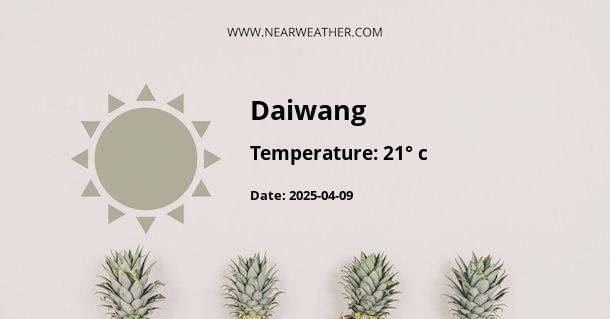Daiwang, China: Climate and Weather Year Round
Daiwang is a beautiful town located in the Heilongjiang province of northeastern China. It is known for its stunning landscapes, rich cultural heritage, and diverse climate. Understanding the climate and weather patterns of Daiwang is essential for both residents and visitors to plan their activities and make the most of their time in this region. In this article, we will explore the climate and weather patterns in Daiwang throughout the year.
Climate Classification
Daiwang falls under the humid continental climate classification, which is influenced by its northern location and proximity to Siberia. This classification is characterized by hot and humid summers, long and cold winters, and distinct seasons throughout the year.
Seasonal Overview
Spring (March to May): Spring in Daiwang is characterized by mild temperatures, with average highs ranging from 8°C (46°F) to 16°C (61°F) and lows ranging from -6°C (21°F) to 4°C (39°F). It is a transition season when the landscape starts to come alive with blossoming flowers and vibrant colors.
Summer (June to August): Summers in Daiwang are warm and humid, with average daytime temperatures ranging from 20°C (68°F) to 28°C (82°F). However, temperatures can occasionally reach close to 35°C (95°F) during heatwaves. The nights are relatively cooler, with temperatures ranging from 13°C (55°F) to 19°C (66°F). It is the wettest season of the year, with frequent rainfall and occasional thunderstorms.
Fall (September to November): Fall in Daiwang is a beautiful season, characterized by mild temperatures and stunning autumn foliage. Average highs range from 11°C (52°F) to 20°C (68°F) and lows range from 0°C (32°F) to 8°C (46°F). It is a relatively dry season, with less rainfall compared to summer.
Winter (December to February): Winters in Daiwang are long, cold, and snowy. Average highs range from -9°C (16°F) to -3°C (27°F), while lows can drop to -27°C (-17°F) or even lower during extreme cold waves. Heavy snowfall is common during this season, creating a picturesque winter wonderland.
Precipitation
Daiwang receives a significant amount of precipitation throughout the year, with the highest levels occurring during the summer months. The annual average precipitation is around 600-800 mm (23-31 inches), with the majority falling as rain during the summer and as snow during the winter. It is important to note that precipitation levels can vary from year to year.
Sunshine Hours
Daiwang enjoys a moderate amount of sunshine throughout the year. In summer, the town receives around 8-9 hours of sunshine per day, while in winter, the sunshine hours decrease to around 2-3 hours per day. Spring and fall experience a gradual increase and decrease in sunshine hours, respectively.
Extreme Weather Events
Due to its location, Daiwang is susceptible to extreme weather events. During summer, thunderstorms can occur, occasionally accompanied by heavy rainfall and strong winds. In winter, blizzards and cold waves are not uncommon, which can lead to transportation disruptions and the need for proper winter clothing and precautions.
Conclusion
Daiwang experiences a humid continental climate with distinct seasons throughout the year. From the blossoming springs to the snowy winters, each season offers its own unique charm. It is important for residents and visitors to be prepared for the specific weather conditions during their stay in Daiwang, whether it is the summer rains or the winter cold. By understanding the climate and weather patterns, individuals can make informed decisions and fully enjoy all that Daiwang has to offer.
A - Daiwang's Latitude is 34.396858 & Longitude is 109.294273.
A - Weather in Daiwang is 17° today.
A - Climate Conditions in Daiwang shows few clouds today.
A - Humidity in Daiwang is 34% today.
A - Wind speed in Daiwang is 12.13 km/h, flowing at 183° wind direction. today.
